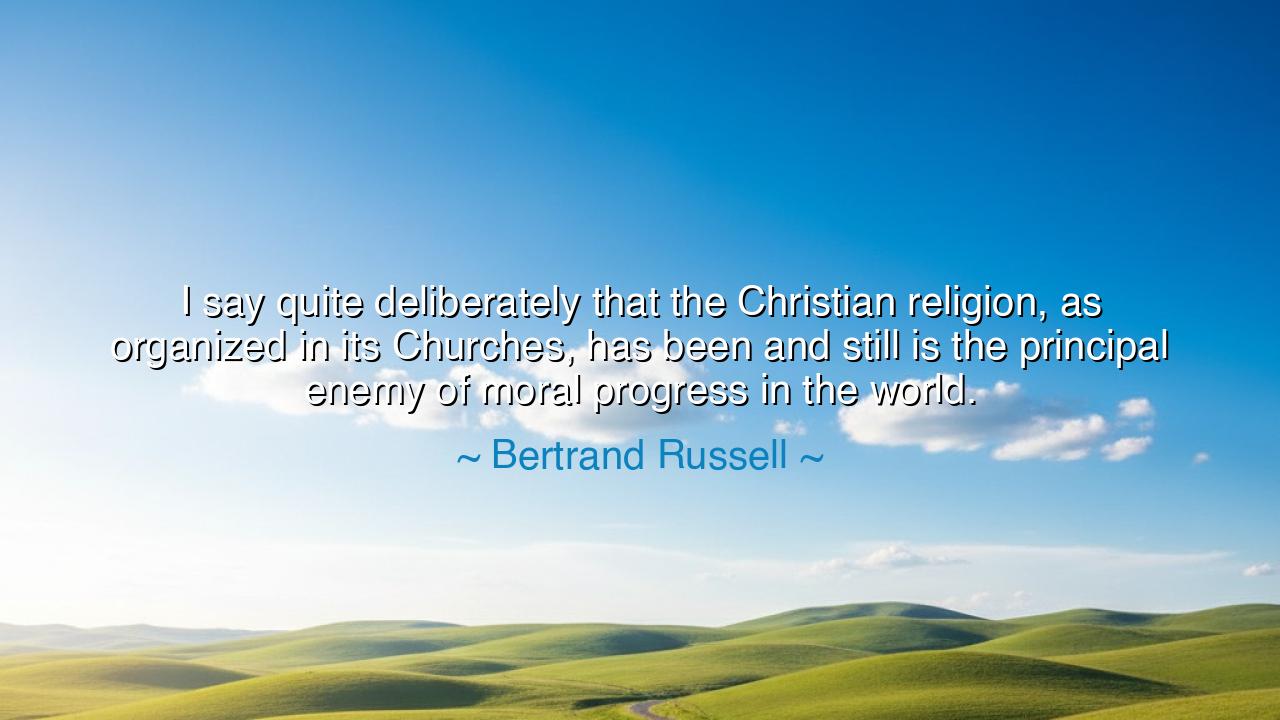
I say quite deliberately that the Christian religion, as
I say quite deliberately that the Christian religion, as organized in its Churches, has been and still is the principal enemy of moral progress in the world.






In the vast ocean of human history, where civilizations rise and fall, where the hearts of men are stirred by both greatness and suffering, there emerges a voice that challenges the very foundations of our beliefs. Bertrand Russell, a philosopher of sharp intellect and uncompromising reason, declared with unwavering conviction: “I say quite deliberately that the Christian religion, as organized in its Churches, has been and still is the principal enemy of moral progress in the world.” These words, spoken in the 20th century, reflect not just an opinion, but a deep reckoning with the past, a call to critically examine the institutions and powers that shape the moral landscape of society.
Russell’s critique is not of Christianity itself as a set of spiritual beliefs, but of the Churches, those institutions that, throughout history, have often wielded tremendous power over the lives of individuals and the course of human affairs. From the Middle Ages to the modern era, the Church has been a force of both enlightenment and oppression. Its influence over kings, emperors, and ordinary people has shaped the moral codes of many societies, often with disastrous consequences. The history of the Inquisition, the Crusades, and the oppression of women, among countless other examples, serves as a stark reminder of how the organized Church has sometimes been a stumbling block to the moral evolution of humanity.
The Crusades, for instance, which were fought in the name of Christianity, stand as one of the most infamous examples of how religious institutions, when empowered by the belief in their divine mission, can justify the bloodshed of thousands. Pope Urban II’s call to arms in 1095, invoking the name of Christ, led to the slaughter of Muslims and Jews, the very act of violence being seen as a moral duty. The Church sanctioned these acts of brutality as part of a divine plan, and in doing so, it obstructed the moral progress of the age, sowing division and hatred where there might have been understanding and peace. Russell saw this as emblematic of a greater truth: when religion is organized and wielded by human institutions, it often becomes an instrument not of moral elevation, but of moral repression.
Bertrand Russell’s words are not an isolated condemnation but a recognition of the history of power that religious institutions have sought to maintain at the expense of human freedom and progress. Take, for example, the case of Galileo Galilei, whose scientific discoveries about the heliocentric nature of the solar system were opposed by the Catholic Church. Galileo’s truth—which later laid the foundation for modern science—was suppressed because it threatened the Church’s long-held authority over knowledge. The Church condemned Galileo to house arrest for daring to speak against the geocentric model, which had been supported by religious doctrine. Here, we see how the Church’s influence was used to stifle progress and imprison the human spirit in the chains of outdated beliefs.
But Russell’s critique extends beyond the past into the present. The Church’s historical refusal to adapt to evolving understandings of human rights, gender equality, and scientific discovery continues to hinder moral progress. Consider the Church’s stance on birth control or its treatment of LGBTQ+ individuals, issues that many see as fundamental to the advancement of human rights and dignity. The moral progress that Russell advocates for is not simply the expansion of personal freedoms, but the embracing of a universal compassion that transcends dogma and extends to every corner of society.
Yet, it would be incomplete to view Russell’s statement only as a blanket rejection of Christianity. His warning is about the dangers of any institutionalized religion when it becomes a tool for power and control, suppressing the natural moral growth of individuals and societies. At its core, Russell’s argument calls us to look beyond religious authority and dogma to find the true moral compass that lies in our hearts—the pursuit of justice, equality, and human dignity. These values, though often championed by religion, must not be confined within the walls of any Church, but embraced by all of humanity, irrespective of faith.
In reflecting upon Russell’s words, we must ask ourselves: how do we, in our own time, confront the tension between the moral values we hold dear and the institutions that claim to uphold them? We are all stewards of moral progress, and it is our duty to ensure that moral evolution is not stifled by dogmatic forces, but is instead guided by the universal principles of compassion, justice, and freedom. Let us recognize that true moral progress is not found in the preservation of outdated beliefs, but in the courage to evolve, to question, and to embrace the best of what humanity has to offer—regardless of religious affiliation.
The lesson of Bertrand Russell’s words is a clarion call to action: to challenge not only the institutions that claim moral authority but also the ideas that seek to limit the freedom and potential of humanity. Let us build a world where moral progress is not bound by the walls of religion, but is instead driven by the universal desire for justice, understanding, and human dignity. Be wary of those who use religion to claim moral superiority or to hold others in subjugation, and instead, let us forge a path towards a future where moral progress is guided by reason, compassion, and freedom for all.






AAdministratorAdministrator
Welcome, honored guests. Please leave a comment, we will respond soon